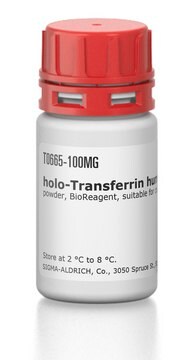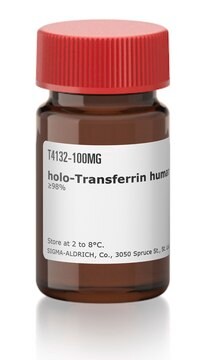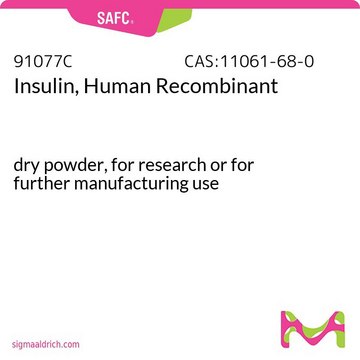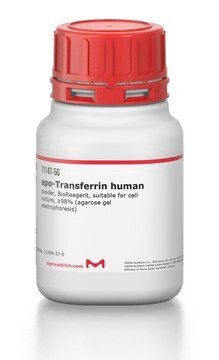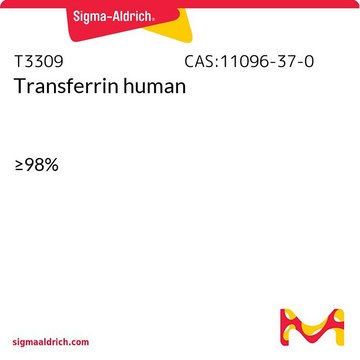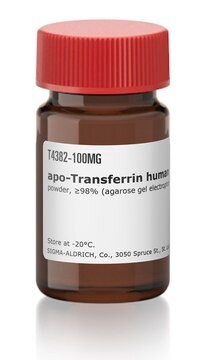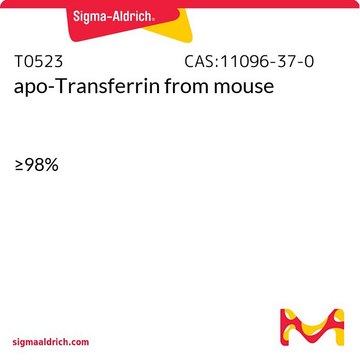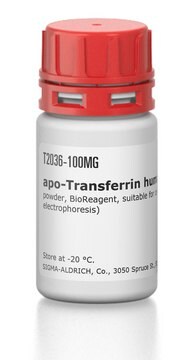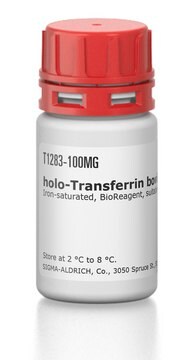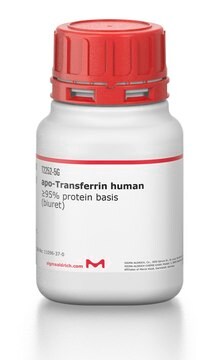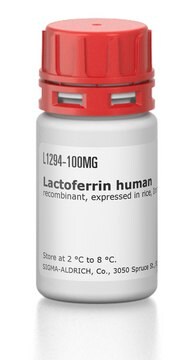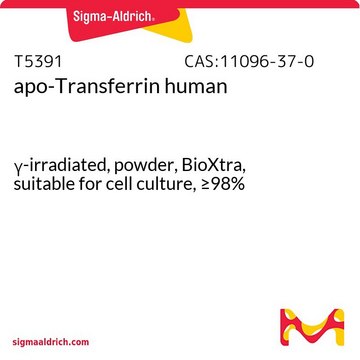SRP6512
Transferrin (HOLO) from human plasma
≥95% (SDS-PAGE)
Sinônimo(s):
DKFZp781D0156, PRO1557, PRO2086, Siderophilin, TF
Faça loginpara ver os preços organizacionais e de contrato
About This Item
Código UNSPSC:
12352202
NACRES:
NA.32
Produtos recomendados
Descrição geral
Transferrin is a monomeric glycoprotein found in plasma at an average concentration of 250 mg/100ml. Transferrin (TF) belongs to the family of bilobal glycoproteins which tightly bind ferric iron. Each of the homologous N- and C-lobes of the protein contains a single iron-binding site present in a deep cleft.
Aplicação
Transferrin (HOLO) from human plasma has been used in flow cytometry.
Ações bioquímicas/fisiológicas
Transferrin (TF) serves as the iron transport protein in the blood. Iron is transported in the serum by binding to circulating transferrin, which in turn binds to receptors on the cell surface. Stored in bone marrow as TF-bound iron, it also possesses bacteriostatic and fungistatic activity. At the alkaline extracellular pH of 7.4, TF binds one or two ferric ions and two iron-bound TF molecules can bind the dimeric transferrin receptor (TfR). At this pH, iron-free transferrin is not recognized by TfR. This is followed by an endocytotic pathway involving the TfR, where the entire complex is internalized by endocytosis. When the pH is reduced in the cell, iron is released from TF leading to a conformational change in each lobe. Two critical lysines in the N-lobe of TF aid this conformational change allowing entry of a chelator to capture the iron. Finally, the complex gets back to the cell surface and the extracellular pH causes the dissociation of the apo-TF molecules from the receptor. Clinically, decreases in transferrin are observed in congenital disorders, newborns, inflammatory diseases, hypo-proteinemias and nephritic syndrome; increases are found in pregnancy, iron-deficiency anemias and inoculation hepatitis. Transferrin is required by all types of cells in cultures for maximal growth. It is, therefore, an important factor used in defined culture media.
forma física
Lyophilized from 20 mM Na phosphate, pH 7.4 and 150 mM NaCI.
Código de classe de armazenamento
11 - Combustible Solids
Classe de risco de água (WGK)
WGK 3
Ponto de fulgor (°F)
Not applicable
Ponto de fulgor (°C)
Not applicable
Escolha uma das versões mais recentes:
Certificados de análise (COA)
Lot/Batch Number
Não está vendo a versão correta?
Se precisar de uma versão específica, você pode procurar um certificado específico pelo número do lote ou da remessa.
Já possui este produto?
Encontre a documentação dos produtos que você adquiriu recentemente na biblioteca de documentos.
Os clientes também visualizaram
Transferrin receptor 1 is a cellular receptor for New World haemorrhagic fever arenaviruses
Sheli R
Nature (2007)
Peter J Halbrooks et al.
Biochemistry, 44(47), 15451-15460 (2005-11-23)
The transferrins (TF) are a family of bilobal glycoproteins that tightly bind ferric iron. Each of the homologous N- and C-lobes contains a single iron-binding site situated in a deep cleft. Human serum transferrin (hTF) serves as the iron transport
Yifan Cheng et al.
Cell, 116(4), 565-576 (2004-02-26)
Iron, insoluble as free Fe(3+) and toxic as free Fe(2+), is distributed through the body as Fe(3+) bound to transferrin (Tf) for delivery to cells by endocytosis of its complex with transferrin receptor (TfR). Although much is understood of the
Nossa equipe de cientistas tem experiência em todas as áreas de pesquisa, incluindo Life Sciences, ciência de materiais, síntese química, cromatografia, química analítica e muitas outras.
Entre em contato com a assistência técnica